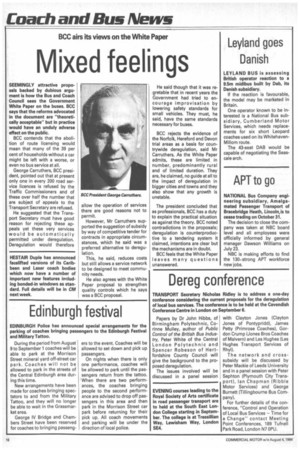Mixed feelings
Page 18

If you've noticed an error in this article please click here to report it so we can fix it.
SEEMINGLY attractive proposals backed by dubious argument is how the Bus and Coach Council sees the Government White Paper on the buses. BCC says that the reforms advocated in the document are "theoretically acceptable" but in practice would have an unduly adverse effect on the public.
BCC contends that the abolition of route licensing would mean that many of the 39 per cent of households without a car might be left with a worse, or even no bus service at all.
George Carruthers, BCC president, pointed out that at present only one in every 200 road service licences is refused by the Traffic Commissioners and of these over half the number that are subject of appeals to the Transport Secretary are refused, He suggested that the Transport Secretary must have good reason for rejecting these appeals yet these very services would be automatically permitted under deregulation. Deregulation would therefore allow the operation of services there are good reasons not to permit.
However, Mr Carruthers supported the suggestion of subsidy by way of competitive tender for contracts in appropriate circumstances, which he said was a preferred alternative to deregulation.
This, he said, reduces costs but still allows a service network to be designed to meet community needs.
He also agrees with the White Paper proposal to strengthen quality controls which he says was a BCC proposal. He said though that it was regretable that in recent years the Government had tried to encourage improvisation by lowering safety standards for small vehicles. They must, he said, have the same standards necessary for buses.
BCC rejects the evidence of the Norfolk, Hereford and Devon trial areas as a basis for countrywide deregulation, said Mr Carruthers. As the White Paper admits, these are limited in number, predominantly rural and of limited duration. They are, he claimed, no guide at all to the impact of deregulation in bigger cities and towns and they also show that any growth is unstable.
The president concluded that as professionals, BCC has a duty to explain the practical situation as against the theory. BCC noted contradictions in the proposals; deregulation is counterproductive to a tendering system it claimed, intentions are clear but the mechanisms are in doubt.
BCC feels that the White Paper leaves many questions unanswered.
























































































